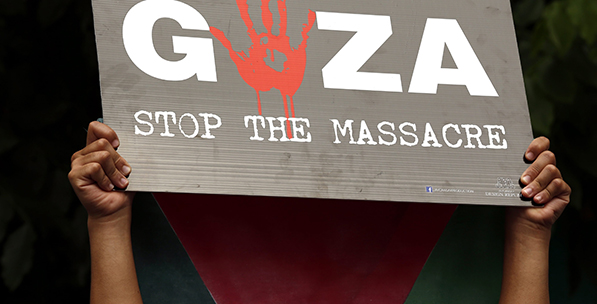Israel has an obsession with the Middle East and itself. The name of this obsession is “to win.” Israel thinks that it must keep winning. And the limit is uncertain. For instance, what is the scenario in which Israel would believe that it has finally won? Will Israel win if the Palestinians who are sandwiched in Gaza surrender? What is the measure of Gaza’s throwing in the towel? What is the guarantee of Israel’s lifting the embargo on Gaza or of not attacking Gaza? Will Gaza be counted as knuckled down if it completely ends the so-called missile attacks that barely harm Israel and that are not worth mentioning in the face of Israeli military power?
What about the West Bank? What is necessary for Israel to promise Palestinians a future without massacre? What must, or must not, be done to end Israeli occupation? What is it that the Palestinians give consent to and let go of in order for Israel to stop sending tens of thousands of new settlers each year to the Palestinian territory despite all local and international reactions?
Is there really a roughly satisfactory answer to these questions? For instance, what had Israel promised even when the Palestinian Authority dropped almost all of its claims, as was the case in the Israeli-Palestinian talks that were leaked in recent years? Why was there not even small progress in the process?
It is quite clear that Bashar Assad in Syria, Nouri al-Maliki in Iraq and Abdul Fattah el-Sissi in Egypt did in their countries in the last four years what Israel has been doing for years. As a result, at least three forms of Israel and two of the U.S. has emerged in the region. Nowadays, the atmosphere created by the actors is wreaking havoc on all of the Middle East. Saudi Arabia backs Sissi as strongly as the U.S. backs Israel. Similarly, Iranian support of Assad and Maliki is not different from that of the U.S. for Israel. It is enough to change only the names of the actors without playing much with the content of any statement issued by the White House. Do the U.S., Saudi Arabia, Iran have anything (else) to say, or have any (other) position to take, rather than saying that Israel, Sissi, Assad and Maliki are fighting against terror?
Obviously, the situation heavily suppresses the aggrieved and weak people of the Middle East and drives them into desperation. We see that Israel and other actors who are on the same page with Israel perceive the generated cost as an opportunity.
The only thing they do is let the crisis deepen. They are trying to extend the time of the collapsing Camp David Accords and the Sykes-Picot Agreement. We are witnessing the efforts of those who do not wish to see the big picture and who try to hide the current major tension behind the details of daily crises.
There is an Israel problem in the Middle East and there are other crises that are gangrened around this issue. Different actors talk about the problem, but they themselves exploit the very same problem. Israel, on the other side, is in a much more desperate position. Israel appears to certainly believe it cannot survive without the “Israel problem.” Israel can neither come up with a vision of a positive future for itself neither does know what to do with Palestinians in the long run. Therefore, it becomes impossible to have hopes for peace and order in the region unless Israel faces the “Israeli problem.” What is the “Israeli problem” then? It is nothing but the Israeli occupation.



